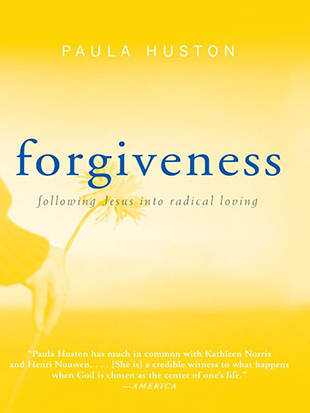Paula Huston is the author of many books including The Holy Way: Practices for a Simple Life. A former university literature teacher, she is a wife, mother, grandmother, and Camaldolese Benedictine oblate.
Huston believes that forgiveness is the central hub of Christianity and that it serves as an outward and visible sign of Christ's redemptive presence. This mysterious and transformative process relates directly to the question of evil and the problem of justice in the world. "Forgiveness is the final form of love," theologian Reinhold Niebuhr said. Mahatma Gandhi noted: "The weak can never forgive. Forgiveness is the attribute of the strong."
Huston salutes Jesus' act of forgiveness from the cross as a model of Christian love. What is it in human nature that prevents us from doing the same? The author shares a very personal account of her own quest for fame as a writer and the disappointment it brought her. When her runaway ambition was thwarted she blamed others for obstructing her path to glory. Self-centeredness lies at the core of our inability to forgive ourselves and others.
Huston turns to the Desert Fathers and Mothers for insights into the kinds of spiritual disciplines that can open the heart and make us more merciful. One of the best of these is "guarding the heart" against temptations of selfishness. A diligent life of practice enabled the early Christians to live in a new way:
"Their expansive caritas (love), however, has little to do with the kind of universal tolerance preached today. What they saw in another human being, no matter how degraded, was a fellow soul made in the image and likeness of the God they adored. The greatest of these spiritual masters could not bear the thought that anyone, no matter what he or she had done, should be condemned by his or her own hardness of heart to live apart from God."
Huston takes up the challenge of discussing forgiveness in terms of our birth families, marriages, and community. She makes it clear that genuine forgiveness does not have to result in reconciliation: "Prudence might require that we keep a safe distance from those who are not yet healed of their propensity to wreak havoc in other lives." Forgiveness is the one thing that has enabled many couples to avert divorce. It is also a fruitful practice in letting go of the past and overwhelming feelings of anger and rage about a partner. Huston also talks about forgiveness in the context of community where disputes run rampant. In the last analysis, God's grace is what makes the healing balm of forgiveness so meaningful:
"Forgiveness, as difficult and delicate as it may be, is — bottom line — our only hedge against self-destruction. It is not an option but a necessity."
